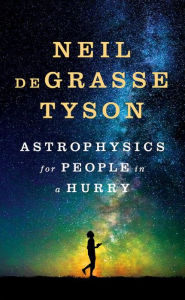
I don’t have a particularly strong science background. I took the basics in high school–chemistry, biology, physics–then took a little more physics in college, but for the most part, science never really “spoke to me.”
So a book on astrophysics is a stretch for me, even one written for a lay audience. And I’ll admit there was a lot in here (especially in the discussions early in the book about the physics of the Big Bang) that I just don’t understand.
But all that said, it was nevertheless an intriguing, interesting read, and despite my layers of technical confusion, each chapter gave me something to hold onto.
Neil deGrasse Tyson has become a popular spokesman for science and education in recent years, especially after the popularity of the second version of the Cosmos television series. But he’s particularly necessary today when it seems that science, even essential facts, are under attack from the political right. Without people like Tyson fighting for continued exploration of the cosmos and basic science education, we’re dooming ourselves to becoming a second-rate nation in the future.
But the book itself isn’t overtly political. It’s a guide to the wonders of studying the cosmos. The final chapter, however, is a wonderful mediation on what a more expansive view of our place in the cosmos could mean for reducing our stupid conflicts here on Earth. Studying the universe’s origins may even be a way of bringing us together.
I think we should all Tweet him to run for office. We need someone like him injecting this perspective into our partisan and myopic political system.
Oh, and if you want your mind blown, read the book. I now have questions that are going to bug me, and that I suspect can’t be answered, at least not in a way that I’ll be able to grasp. For example, if before the Big Bang, all the matter and energy that is in our universe was mashed together into something smaller than the period at the end of this sentence, what was beyond it that it expanded into? And now that it’s still expanding, what is it expanding into? In other words, what’s one inch past the boundary of the universe? These things will keep me up at night. But the book is a tremendous vehicle to renew one’s wonder about one’s place in the universe.
So a book on astrophysics is a stretch for me, even one written for a lay audience. And I’ll admit there was a lot in here (especially in the discussions early in the book about the physics of the Big Bang) that I just don’t understand.
But all that said, it was nevertheless an intriguing, interesting read, and despite my layers of technical confusion, each chapter gave me something to hold onto.
Neil deGrasse Tyson has become a popular spokesman for science and education in recent years, especially after the popularity of the second version of the Cosmos television series. But he’s particularly necessary today when it seems that science, even essential facts, are under attack from the political right. Without people like Tyson fighting for continued exploration of the cosmos and basic science education, we’re dooming ourselves to becoming a second-rate nation in the future.
But the book itself isn’t overtly political. It’s a guide to the wonders of studying the cosmos. The final chapter, however, is a wonderful mediation on what a more expansive view of our place in the cosmos could mean for reducing our stupid conflicts here on Earth. Studying the universe’s origins may even be a way of bringing us together.
I think we should all Tweet him to run for office. We need someone like him injecting this perspective into our partisan and myopic political system.
Oh, and if you want your mind blown, read the book. I now have questions that are going to bug me, and that I suspect can’t be answered, at least not in a way that I’ll be able to grasp. For example, if before the Big Bang, all the matter and energy that is in our universe was mashed together into something smaller than the period at the end of this sentence, what was beyond it that it expanded into? And now that it’s still expanding, what is it expanding into? In other words, what’s one inch past the boundary of the universe? These things will keep me up at night. But the book is a tremendous vehicle to renew one’s wonder about one’s place in the universe.
 RSS Feed
RSS Feed
